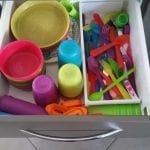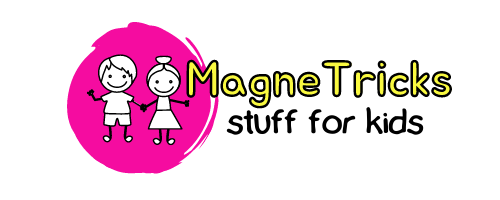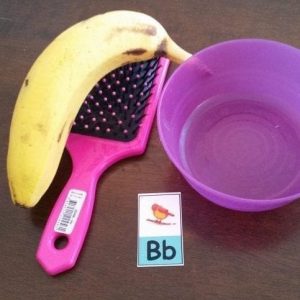It’s time to share with you some important information about kids doing chores. The biggest question my customers ask me is “what chores should my kids be doing?” The answer is not as simple as you might think because the best way to teach your kids to do chores is to help them do big chores in little ways. Let me explain how this can work for children of different ages.
Lets start with some key points
- All chores for children should be a mix between jobs they can do on their own and jobs they do with you. This changes from more with you the younger they are, to more independent as they get older.
- The systems you use at home to organise things will either make it easy for your kids to learn to do chores or too hard for them to do it successfully without you.
- The same chore can look very different for a 4 year old to what it does for an 8 year old – it’s about progressively teaching them to learn how to do a task completely.
Now, lets get to some specifics with different jobs and age groups.
AGES 2 - 3
General jobs include picking up and putting away toys. Make sure whatever they do put away they know where the toys go and it’s easy for them to do so. They probably won’t do every toy so ask them to do one area or one type (blocks).
Little ones can ‘make their own bed’ by putting their pillow in the right place or pulling their blankets up. This can be a job you do together, or you can allow them to ‘make their bed’ and not fix it once they’re done 😉
Give your little mister or miss a cloth or disinfectant wipe and let them wipe down tables. This is a habit you can start as an ‘after breakfast’ ritual, or other times. What’s important is that it’s their special job and you praise them for making such a significant contribution to maintaining the house.
Some children at this age will also be great at putting rubbish in the bin. Some of them however will be obsessed with either putting things in the bin that aren’t meant to go in there or taking things out. You’re the best judge as to whether your child can handle the task or not. If they need motivation to put rubbish in the bin, stick eyes to your bin and call it a bin monster… they’ll want to feed it (pic further down).
 These guys can HELP you put away dishes – quite easily. The biggest thing you need to consider is that they can reach what they need to and they know what they can and can’t put away.
These guys can HELP you put away dishes – quite easily. The biggest thing you need to consider is that they can reach what they need to and they know what they can and can’t put away.
We opted for a plastics drawer in our house – it does make it easier for your young ones to access what they need AND be able to help put things away.
As with the dishes, washing is all about helping. Once again, if you want your children to help you need to consider how to make it as easy for them to help as possible.
When you’re hanging out the washing, your little buddy can absolutely hang out smaller items (undies, socks, face washers) on a clothes airer. This may or may not be suitable for you depending on your climate and home, but it’s a great way for them to start learning how to deal with washing.
They can also practice trying to fold easy items like face washers. Show them the first time and let them have a go. They will struggle at first but the more they do it the better they will get. Also, the more you tell them how clever they are the more they will want to.
AGES 4 - 5
As with the younger kids, picking up after themselves (especially toys) is really important at this age. Having a place for everything will make it much easier for them to complete the task without too much fuss. If they can’t get through it on their own, do it with them.
4 to 5 year old’s are pretty keen to help, especially if the reward is a really cool job that they don’t always get to do… like controlling the awesome vacuum cleaner. Getting to vacuum is often enough of an incentive for them to clean up all of their toys. So, let them vacuum a bit. win win!
Once again wiping down tables with a cloth or disinfectant wipes comes into this age range. They will do a better job especially if they started at 2, and they can also start to dust household items that aren’t too fragile. You can dictate the areas that they’re allowed to dust.

You shouldn’t have any issues with the right things going in the bin at this age, so get them to feed that bin monster. “Our monster’s hungry, get all the rubbish you can find as quickly as possible!” Makes for a tedious chore completed quickly and with ease.
The beds are now being made neatly with a teddy or two placed in a perfect spot. At this age they’re starting to feel pride in their things. Still, if their bed has 5 blankets, 2 pillows and is a loft bed… they’re going to struggle. An easy bed set up will make your life easier and will be more encouraging for them.
School is upon us so learning how to pack and unpack their own school bags is an important chore to get into your every day life.
We can also start watering plants and weeding at this age! Alongside a parent is best, at least until they know exactly how to go about it and are strong enough to pull a huge weed out instead of just ripping the leaves off.
We’re moving beyond only cutlery and plastics now but definitely not up to sharp, fragile or overly heavy items.
Once again the big thing to consider is ‘can my child reach everything they need to and do they know where everything goes?’ They still may need help at this point, depending on your kitchen set up.
It’s important to make sure they don’t get overly confident when you’re not noticing! They’re bound to realise that if they carry 4 plates instead of one they make less trips… but what they don’t understand is that 4 plates are much heavier. Keep working it with them or stay in the vicinity beyond these ages.
4-5 year old’s can start to fold more items of clothing (or trying to) including their own undies, pants, t-shirts, etc. They might not do it perfectly and they’re likely to get frustrated from time to time. Practice makes perfect so when they are struggling, stop and help them step by step.
They can put away more of their own washing. All of it if it’s easy enough for them to do so, it all just depends on how you store their clothes.
 Your kids should be managing their own dirty washing at this stage. Not washing it (unless you’re game) but putting their dirty clothes in the appropriate places. If you sort your washing, make it easy for them to sort it too. Have a separate laundry basket for school clothes – it makes it much easier for you to wash and find their school clothes when needed!
Your kids should be managing their own dirty washing at this stage. Not washing it (unless you’re game) but putting their dirty clothes in the appropriate places. If you sort your washing, make it easy for them to sort it too. Have a separate laundry basket for school clothes – it makes it much easier for you to wash and find their school clothes when needed!
AGES 6 - 7
Now we’re looking at doing the same things the 4 and 5 year old’s do but adding far more independence. They should be pros at tidying all of their own belongings, and it should be expected that they do so.
They should be packing and unpacking their own school bags, some may also be helping make their own lunch.
Dusting and wiping things down can be done better with very little help. Unless of course they’re just starting it out for the first time.
Vacuuming is not as exciting any more, but they can do it better. You can also allow them to practice sweeping indoor or outdoor areas which is a fair bit trickier than vacuuming.
Watering plants is also easier and so is helping to weed the gardens. Consider how dog poo can be dealt with easily and cleanly – they can help with this too.
It’s easy for children at this age to see chores as a ‘chore’ and not be as interested in doing jobs. It’s important for them to feel good about doing it, and see benefit for themselves if they do. If you’ve started by making chores positive from a young age you will have less trouble with this. If your children are discouraged there are plenty of things you can do to help them do it willingly. I talked about some of these in THIS BLOG.
Not only can children put dishes away at this age, they can start learning how to dry and/or wash. If you have a dishwasher they can help you pack the dishwasher.
They should always be expected to bring their dirty dishes to the bench, sink or dishwasher. This just makes the cleaning up process of the household easier for everyone.
As with the younger children… washing consists of putting their own clothes away, folding SOME washing, and managing their dirty clothes.
Why don’t they fold all of their own clothes? Because they won’t. It’s hard for a child to see the point and they’ll realise it’s quicker and easier to scrunch everything into a pile and chuck it in a drawer or cupboard. It’s not easy, but you still need to do this one together.
Dirty washing should never really be left in their rooms. School uniforms must be put in a specific place away from other clothes so you can find them if you need to. A good system makes chores easier for children AND adults.
Beyond 7
Ok, by now you get the point. The key to getting kids to do chores is to introduce the chores to them bit by bit. Move gradually from doing it together to giving them the reigns. Make sure when you give them the reigns, you have something to help them keep track of their jobs and remember what to do.
Basic jobs will be fairly independent from this age on. Some 7 or 8 year old’s still won’t be able to do jobs on their own. If that’s the case just bring the job back a little bit.
Life as a child is actually really busy for a little brain so you do need to make sure you’re not expecting them to do too much. You can’t expect them to just remember what to do and how to do it each and every day. Keep your expectations at a reasonable level and just be super proud of them. Doing the regular every day things to manage their own space, routines and belongings is enough. They don’t need to do every single chore in the house, but they do need to contribute something and manage their own impact on their environment.
You can add things like mopping, cleaning benches, independently washing or drying dishes, washing windows, etc from this age. When they get to about 10 you can introduce cleaning bathrooms and toilets properly. Not as a regular job, but as a sometimes contribution. If everyone helps from time to time it lessens the burden for one person.
Summary
Don’t be worried about letting children try chores as long as it’s in your company. If they show interest, use it to engage them and teach them how to do different tasks. Give them some responsibility and freedom where they can’t hurt themselves or break things. Then do chores with them when it’s beyond their capability.
Make changes to the way you organise your home and the systems you use to help your kids succeed at helping around the house. A child who feels like they can’t do it will never want to do chores no matter how much you encourage them





